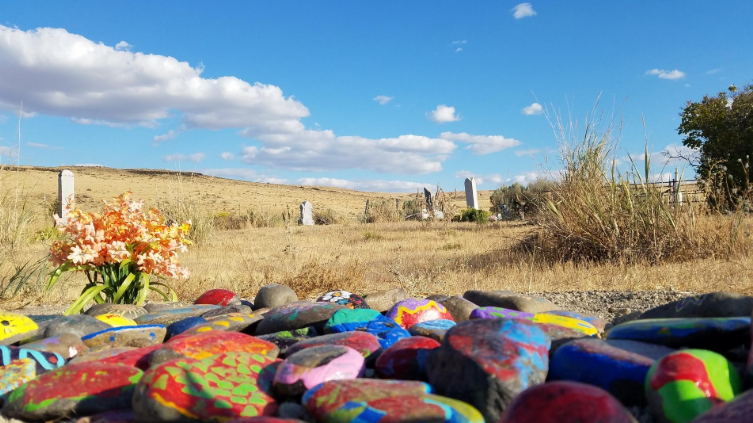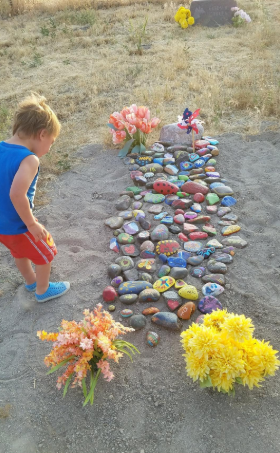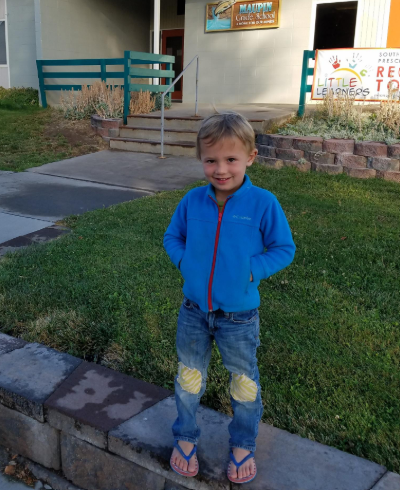When her 4-year-old son died, she wanted a home funeral. A professional didn't know that was possible

EUGENE, Ore. – When an accident took the life of her 4-year-old son, Keelia Carver wanted to take his body back to the family ranch, his home.
More than that, she wanted to spend time with him, to touch his hair, to kiss his face and to say goodbye. But she said the medical examiner didn’t think it was possible.
“Why would that body not be ours to spend time with?” said Carver. “Why would that body spend time with some strangers who were very nice but didn’t know him, and because they didn’t know (him) they couldn’t love him?”
The Carver family went to work to bring the body of their eldest son, Max, home, and later, after cutting through red tape, lay him to rest on their property.

Many believe it's not a choice at all
What the bereaved mother found was that under Oregon law, no one is required to purchase the services of a funeral director or funeral home, but people so rarely opt to hold a home funeral that many believe it’s not a choice at all. In addition to grieving families not knowing their rights, Carver said she found professionals, including medical examiners and nurses, were unclear on what rights grieving families have.
With a team of other volunteers, Carver set out to help death professionals and grieving families understand rights over the bodies of deceased loved ones as well as resources for home funerals. While Max eventually was buried at home, that wasn’t until after the family hired a funeral director, as authorities made them feel they had to. Carver, alongside a team of volunteers launched a website, Oregon Funeral Resources & Education, to save other families from the same mistake.
“We’re hoping that the website is a tool to actually change both professional education and those very basic policies and practices to make sure that they’re aligned with the rights that Oregon families have under the law,” said Holly Pruett, a home funeral guide who co-created the website.
“For the general public, we’re just trying to get as many people to understand that there are benefits to more direct family and community engagement and that there’s a wide continuum of opportunity from 100% DIY to simply perhaps helping to close a grave or witnessing a cremation.”
Families may conduct any or all tasks often performed by a funeral home, other than embalming, which is not required by state law. Sometimes called “family-led after-death care” or “home funerals,” families may care for their dead loved ones in many ways, such as bathing and dressing the deceased; having the deceased at home; spending time with the deceased, sometimes called a wake, vigil, or viewing; filing the death certificate and obtaining a transportation permit; making arrangements for final disposition, or the burial, interment or cremation; transporting the body home or to another location for care and viewing, and to place of final disposition; and making arrangements for any ceremony.
When her son died in 2018, Carver was given a flier listing local funeral homes, and it seemed as if that was the only choice. A Lane County Medical Examiner’s Office informational handout only offers one answer – select a funeral home – to the question “What should I do after being made aware of the death and the involvement of the Medical Examiner?” The handout does not include information about taking a body home.
When asked if medical examiners are trained to allow bodies to be released to family members or if they otherwise help them through the process, Oregon State Police spokesperson Timothy Fox said trainings now include “that,” but did not elaborate. Requests made Friday to speak with the acting chief medical examiner didn’t receive a response.

Death doulas: They provide support, comfort and a new option for the dying and their families
Most people do use the services of a funeral director – they help with paperwork, care for the body and help organize a funeral, among other tasks.
“Most families would prefer not to (act as their own funeral directors) or maybe would want to only do some of the things,” said Mark Musgrove, co-owner of Musgrove Mortuaries that has several locations in Lane County. “Most often we’ve had families that have made their own caskets, or if we care for the body and place the body in a casket, they will pick up the body and take it to another state or cemetery themselves, and it’s legal to do that. But most families choose to have the funeral home do those kinds of service.”
Musgrove, a second-generation funeral director, added that when someone dies, their body is not the possession of the funeral home and the deceased’s family has the right to decide what they’re going to do within the law. While funeral professionals must be licensed with the state, finish a certain amount of schooling, pass certain tests and uphold standards of cleanliness, families have more flexibility.
“When you cook and eat food in your own house, absent there being some really egregious problems, the health department has no right to come to your kitchen and make sure you are following the same kind of protocols that are required in commercial restaurant establishment,” said Judish Moman, a Eugene-based estate planning attorney.
“The same kind of thing applies to a home funeral. If you are not a professional mortician, you should have the right to care for your dead just as much as you should be able to cook your own dinner, but that’s not made very clear,” said Moman, who is part of the team that launched the new website.

As an attorney, she works to empower and educate her clients mourning the death of their loved ones, so the project seemed like a natural fit. She wants the website to be a tool that clarifies the law.
While the death of Max was heartbreaking, after enough self-advocating, the Carver family had the funeral they needed.
The child’s mother held his hand, his father read him picture books, his family sang children’s songs and everyone in attendance was able to take a last look at the boy, dressed in yellow pajamas and stripped socks, before lowering him into the same dirt he spent his brief life playing on.
He refused to go: Dying from cancer, she tried to push him away. They're now married
Bringing Sully home: Soldier stationed in Afghanistan raises thousands to bring home his buddy, Sully the cat
This article originally appeared on USA TODAY NETWORK: Are home funerals possible? How do they work? This family did one

